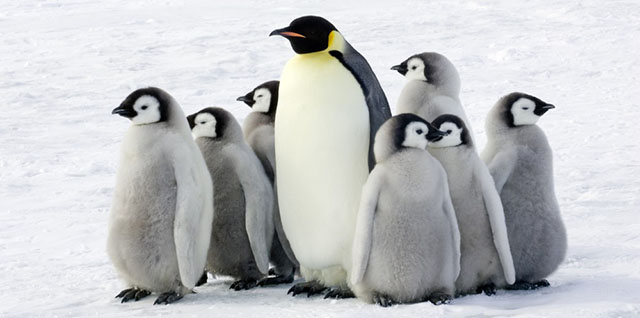动物遇险,我们是否应该伸出援手?
When we see a person in distress, our immediate reaction is to lend a hand. Not to do so would be a moral failure.
当我们看到有人遇险时,第一反应就是伸出援手。否则便会于心不安。
But what if we see an animal in distress, does the same logic apply?
但如果是我们看到动物遇险,同样的逻辑是否还成立呢?
This question was raised following the "rescue" of a group of penguins from an icy gully in Antarctica. It was filmed for the BBC wildlife series Dynasties.
当一群企鹅从南极洲的冰峡谷中获救后,这个问题引发了关注。BBC野生动物纪录片《王朝》拍下了这一过程。
The film crew was alarmed when they saw that a group of penguins had fallen into a gully and been trapped with their young. The crew dug a shallow ramp so that a few of the penguins could save themselves.
拍摄人员看到一群企鹅及其幼崽坠入峡谷,一同被困谷底,感到十分担忧。他们凿出了一段坡道,让一些被困企鹅能够自救。

The case has taken the international media by storm. Viewers watching this episode let out a sigh of relief on social media. "I'm so glad. I understand not getting directly involved, but a helping hand isn't interfering, right?" viewer Kathryn Shaw tweeted.
这件事席卷了全球媒体。观看完这一集后,观众们在社交媒体上松了一口气。“我很开心。我明白不能直接干预,但伸出援手并不算干预,对吧?”观众凯瑟琳·肖发推表示。
However, others think that human intervention is unnatural. It's an unwritten rule among documentary filmmakers that they are there to observe, not to participate, according to CBS News. For example, in another episode of Dynasties, David the chimpanzee, was left to die after he was filmed being beaten up by other chimps.
然而,有些人却认为人类的干预并没有尊重自然法则。据哥伦比亚广播公司新闻报道,纪录片拍摄者中有条不成文的规定:现场观察,并不介入。比如,在《王朝》的另一集中,黑猩猩大卫被拍到遭到其他猩猩的殴打,最后只能等待死亡。
"Tragedy is a part of life. You can't have sunshine throughout your life. To have done anything else would only make matters worse and distort the truth," said the show's creator David Attenborough, according to The Times.
“悲剧是生活的一部分。生活中不可能总是充满阳光。做其他事情干预只会让情况变得更糟,扭曲事实,”据《泰晤士报》报道,该节目的创作者大卫·阿滕伯勒如此表示。
In this case, however, Mike Gunton, the executive producer of the series, said that this was a one-off situation. "There were no animals going to suffer by intervening. It wasn't dangerous. You weren't touching the animals and it was just felt by doing this... they had the opportunity to not have to keep slipping down the slope," he told the BBC.
然而,就此次事件,该纪录片的执行制片人迈克·冈顿表示这只是个案。“没有动物会因为干预行为而受到伤害。这并不危险,你并没有触碰到它们,这么做让它们能有机会逃出生天,”他在接受BBC采访时表示。
Such cases are familiar to Paul Nicklen, wildlife photographer for National Geographic.
美国《国家地理》杂志的野生动物摄影师保罗·尼克伦对类似的情况并不陌生。
"I have a practical view when it comes to the natural rhythm of life," he told Metro. "If it's ever a predator situation, no matter how gut-wrenching, you stay out of the way. Even when you are watching a male polar bear eat a cub."
“在生命的自然韵律方面,我有着一套实践观,”他在接受《地铁报》采访时表示。“如果是在捕食者的狩猎现场,不论场面有多么惊心动魄,你也不能插手干预。哪怕是目睹一只雄性北极熊吞食幼兽。
But he said that he would help animals if he saw no real gain or disruption to the ecosystem.
但他表示,只要不会为生态系统带来实质性的好处或者造成破坏,他会出手相助。
Indeed, there will always be two sides to the coin, and human beings will forever be conflicted in such circumstances. "There's no rule book in those situations. You can only respond to the facts that are right there in front of you," Will Lawson, the show's director, told Daily Mail.
的确,一切事物都会有两面性,人们面对这种情况将会继续争执下去。“面对这些情况并没有明文规定。你只能应对面前出现的客观现实,”该节目导演威尔·劳森在接受《每日邮报》采访时表示。












